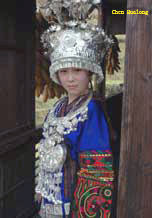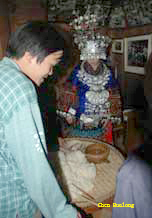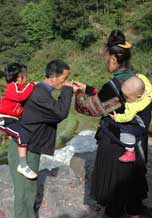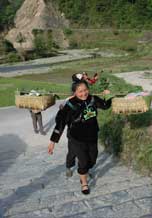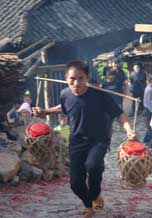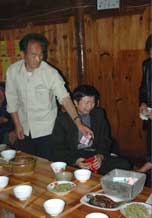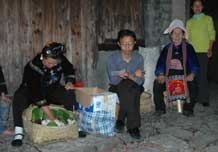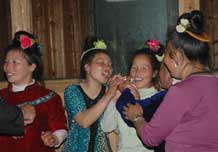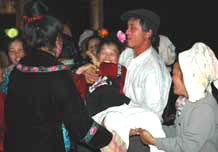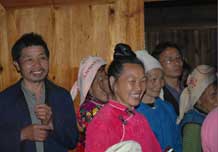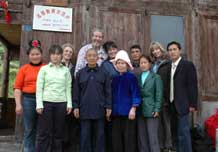 |
Tony's Guizhou Tribal Articles | Home |
 |
 |
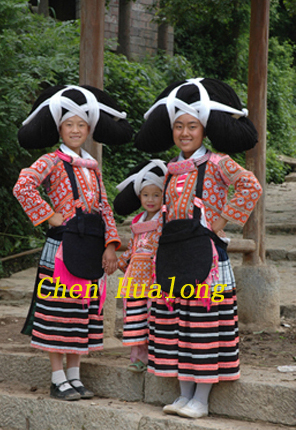 |
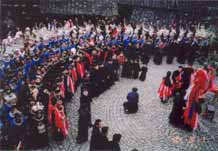 |
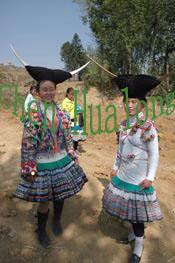 |
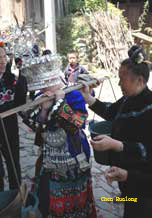 |
| Guizhou Travel Guides-Long Skirt Miao Wedding Ceremony | |||||||||||||||
|
There are several chances for the young to meet each other and to look for their love partners, namely the night of every day, festivals and market days. These seem very important for them at one stage of their lives because marriage occupies an important and initial role for continuing the generations of their families. When night falls, the young boys make the long journey to the girls’ village. They usually walk along stony paths and wade across streams. The reason is that, generally speaking, a boy cannot marry a girl from the same village because they are usually from the same clan. For example, there are four clans in my village - Upper Langde village - but we have a very close relationship, so the boys are not allowed to marry the girls from the village. Xijiang Miao village is, however, an exception, because Xijiang is a large village consisting of 12 small villages, and they are from different clans so a boy from one village in Xijiang can marry a girl from the another village in Xijiang. When the boys arrive at the chosen ground at the edge of the girls’ village, they whistle by mouth or whistle on leaves. When the girls hear the signal, they run to the chosen ground and start to communicate with the boys by singing traditional love songs in groups. As I remember, singing traditional love songs between the boys and the girls was practised in my village and nearby villages a few years ago. However, it is a pity, but now the young seem unwilling to practise the old traditions and they prefer undertake their courtship in the modern way by which they talk to each other in low tones with no traditional songs. I still remember when I was a little boy, I once made a trip to another village with a few adults from my village and we sang traditional songs. There are many songs with various meanings, so we sang different songs at the beginning, the middle and the end and this remains with me as a good and happy memory. During the New Rice Eating festival and the Miao New Year, the young men and young women have more chances to meet each other. These are opportunities for them to check out the wealth of their respective families and to get to know their parents and other relatives. Market days provide an opportunity to deepen the relationship between the boy and the girl. If the boy loves the girl, his family will send the matchmaker to visit the girl’s home and to request the marriage. Usually the go-between is a person who knows the girl’s family very well, and he or she will have a living husband or wife and children which means that he or she must be not a widower or widow. If the girl’s family are happy with the proposed marriage, her parents will invite the matchmaker to a dinner at their home together with the girl’s uncles and aunts. A chicken is boiled with rice gruel for the dinner, and the chicken eyes can tell whether the girl’s parents agree to the marriage or not. If the two eyes are closed, it means that it will be a good wedding; if one is closed and the other open, it means that it is not an auspicious wedding, so they do not go ahead with it. If her parents are not happy with the request for the marriage, the father usually does not stay at home for the meal and just her mother or sisters prepare a simple dinner for the matchmaker and tell him or her to leave the next morning. Taking myself as an example, if I want to marry a girl, and her parents agree to the wedding, my parents and her parents will make a decision to choose an auspicious day to hold the wedding ceremony. For instance, tomorrow is an auspicious day, so in the late afternoon of today, my mother will steam some glutinous rice and wrap it with palm leaves or Korean banana leaves. In the evening, a group of men will leave my village for my bride’s village. The number will be an odd number, usually from 7-11 people. These men will be my uncles and cousins. If the bride’s parents really like the marriage, they will be at home and host me and the men from my village with a good meal and a lot of rice wine. If they do not really like the idea of the marriage, her father and brothers will not stay at home. They will escape meeting us at their home and just her mother, sisters, aunts, cousins - the women and children – will come to her house to see her off. A bonfire will be arranged at the edge of her village in the dead of night and, at the same time, I will share some money and steamed sticky rice with the women and children. As I remember, 20 years ago, my brother gave each of them 2-10 Yuan, but now that people’s income is much better, I think that maybe each will receive 10-50 Yuan. Then bride’s mother, sisters, cousins and the women and children from her village will say goodbye to her, and she will start the journey to the bridegroom’s home with the men. On the way she carries an umbrella in her hand and, if it is a long way, she is dressed in a beautiful day-time dress. If it is near she will be dressed in festival dress with gorgeous silver ornaments and high quality embroidery. She will make the wedding dress herself. The traditional wedding dress includes a pleated skirt, embroidered jacket with silver ornaments, silver necklace, silver crown, and her hair is coiled into a bun which is decorated with three silver birds. The bridegroom carries the bride’s dowry. When the bride arrives at the edge of the bridegroom’s village, she will be greeted by the women and children from the groom’s family including his aunts and cousins. The bride will then be dressed in Long Skirt Miao traditional festival dress and given an umbrella to carry. The bride is escorted to the groom’s home and lots of firecrackers are set off all along the way and inside or near the house. The greater the number of firecrackers the greater the indication of wealth of the groom’s family and the more auspicious the marriage. Before entering the groom’s home, an unmarried boy or girl will help the bride to carry the umbrella into the bedroom of the groom. There will be a table blocking the door. On the table will be some cooked pork, boiled carp, steamed glutinous rice and rice wine. The bride will offer by chopsticks or by hand some cooked pork, boiled carp, steamed glutinous rice and rice wine to the ground to sacrifice to the ancestors of the groom’s family. The bride will be led into the bedroom of the groom and, at the same time, the women accompany her and chat with her. These are the groom’s sisters, sisters-in law, nieces and aunts. After a while, there is a ceremony in the middle hall of the house under the shrine. First of all, the bride offers a piece of cooked pork, some steamed glutinous rice, boiled carp and rice to worship the ancestors, then the groom’s parents will offer rice wine to the bride to drink and give her some money. Meanwhile men from the village will help the groom’s family to kill fat pigs for the wedding. A rich family will kill two or three pigs, a poor family will kill only one. Having a rested for a while, an unmarried boy or girl goes to the well and fetches water. Close to the groom’s house the water is handed over to the bride so that she brings water to the groom’s home. This means that the bride will belong to the new family and that she is willing to serve her new family and her new parents. All these activities will be arranged in the morning. In the afternoon, relatives come to celebrate the wedding bearing many gifts including husked rice, cloth, rice wine and they set off fire crackers. The most senior relative brings a fat pig and more gifts. When they get to the edge of the village, firecrackers are set off, then the men and women of the groom’s clan come to meet their relatives and to help carry gifts. The relatives set off firecrackers and again the greater the number of firecrackers set off the greater the wealth and status of the groom’s family. After arriving at the groom's home, the bride and groom are busy handing out sweets and cigarettes to the relatives and everyone is looking at the bride and saying how beautiful she is. The relatives eat a simple meal after their arrival which includes pork, offal and rice wine. If the groom’s family is rich, the meal will include more food such as chicken, carp and a variety of vegetables and other food. When evening arrives, nearly all the villagers come for the wedding banquet. My traditional wedding was held in April 2007. At that time more than 500 people came to celebrate the wedding, all except for three families were able to come. Men gave money, the amount, between 10-500 Yuan, depending on the closeness of the relationship. The women normally bring rice, eggs, cloth and rice wine. However, my wife, Huyan, is Han, so cloth is not useful to her. Thus the women of my village gave money instead ranging from about 10-100 Yuan. Relatives will give money for the wedding too, and they give more than the villagers. Usually the elder sister will give more money than the younger sister, the younger sister can not give more money than the older sister, even if she is richer but for the elder brother there is an exception. I have two elder sisters and my oldest sister gave 1,488 Yuan, the other sister gave 1,288 Yuan and my brother gave 2,000 Yuan. After giving all their gifts and money, they spread out into different homes to have dinner. Before they start to eat, the shaman hosts the wedding ceremony and offers rice wine and boiled rice to the bride and the groom to wish for good fortune for the marriage and many babies for the new couple. According to the Miao culture, carp have eggs, which means more babies in the future. Huge amounts of food and rice wine are offered by the groom’s family. Rice wine is everyone’s favourite. During the meal, they play a number of guessing games and so on, in order to persuade everyone to drink more rice wine, so that they will have more fun and be happier. The villagers said my wedding was the best one they have ever participated in, with more food and cigarettes (everyone was offered a pack of good quality cigarettes and more were offered by the groom). Usually the food offered by the groom’s family is a dish of lean and fat pork, a dish of pig’s trotters, a dish of pork with bean sprouts and a dish of vegetables - in total about 4 dishes. This time my family had carp, chicken, plenty of lean pork, pig’s trotters and other dishes – in total about 10 dishes. The evening wedding banquet will last into the middle of the night when everyone is drunk and satisfied with the rice wine and the food. On the first night, the bride will stay overnight with the groom. The relatives will stay for few days in the groom’s village The groom’s clan members invite their relatives to have more rice wine and food and the groom’s family members also join in the dinner with more fun being seen during the meal. The dinner at the end of the second and third days will be at the groom’s home and you can see more fun and games with the villagers trying to wrestle the relatives when they are nearly drunk.
When the relatives leave the village for their homes, a huge leg of pork and steamed sticky rice are given as gifts with the senior relative being given a leg of pork with the tail. When their arrive back home, there will be another banquet. After about a week, the bride’s father, brother and uncles will choose an auspicious day and come to visit the groom’s home and ask for the dowry money. A long time ago, the dowry was small, about 500-3,000 Yuan. Now that the Miao in my region are richer than before, the dowry is from about 2,000-30,000 Yuan, usually around 5,000 Yuan which equals about US$ 700. I paid my wife’s family 6,000 Yuan with the rest of the dowry in gifts: 5 huge legs of pork, 10 bottles of alcohol, 10 packs of cigarettes and some sugar. The groom’s family kill another fatted pig to treat the bride’s father, brothers and aunts. The groom’s father, uncles and cousins, join the banquet. There will be a big discussion between the two sides about the dowry. After the dowry negotiations are finished, a meal of boiled chicken and rice are offered and the shaman will check on the chicken eyes to tell whether the wedding is auspicious or not. If both eyes are open or closed, it is an auspicious wedding. If one is open and one closed that means it is a bad wedding. The bride’s father, brothers and aunts will stay in the village for several days. During their stay they are invited to have more food and rice wine by the various families of the groom’s clan. They will then return home with the dowry, steamed sticky rice and a huge leg of pork and the bride will return to her parents’ home with the group. The bride will stay in her village during the busy harvest season or working in the fields. The groom’s family will bring some sticky rice to visit her family, and ask her to come to the groom’s home to help with the agricultural work. This happens several times until the bride is pregnant when she will live with her husband for ever. This article has been submitted by Tony Chen Hualong, a Miao from Langde village in Guizhou province, China. |
|
||||||||||||||
| To make the tour, contact Along | |
| All texts and image by Chen Hualong | Email: tony6868@163.com, alongdiscovery@hotmail.com |
| All rights reserved by Hu Yan | We-chat:13885136348 |
| @2008-2029 | 24 Hour Cell: 0086--13885136348 Tel&Fax:0086-851-86302559 |
